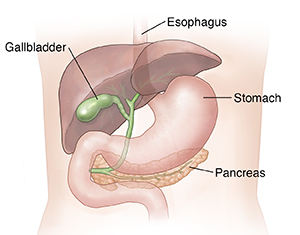Epigastric Pain (Uncertain Cause)
Epigastric pain is pain in the upper belly (abdomen). It can be a sign of disease. Common causes include:
-
Acid reflux (stomach acid flowing up into the esophagus).
-
Gastritis (irritation of the stomach lining). Most often this is from aspirin or NSAIDs (nonsteroidal anti-inflammatory drugs) like ibuprofen, bacteria called H. pylori, or frequent alcohol use.
-
Peptic ulcer disease.
-
Inflammation of the pancreas (pancreatitis).
-
Gallstone.
-
Inflammation in the gallbladder (cholecystitis).
Pain may be dull or burning. It may spread upward to the chest or to the back. There may be other symptoms, such as belching, bloating, cramps, or hunger pains. There may be weight loss or poor appetite, nausea, or vomiting.
Since the cause of your pain is not certain yet, you may need more tests. Sometimes your doctor will treat you for the most likely condition to see if you feel better before doing more tests. Talk with your doctor about what is best for you.

Home care
Medicines
-
Antacids help neutralize the normal acids in your stomach. If you don’t like the liquid, you can try a chewable one. One may work better than another for you. Overuse can cause diarrhea or constipation. Call your doctor if you have questions about your medicines or concerns about side effects.
-
Acid blockers (H2 blockers) decrease acid production. Examples are cimetidine and famotidine.
-
Acid inhibitors (PPIs) decrease acid production in a different way than blockers. You may find they work better but can take a little longer to take effect. Examples are omeprazole, lansoprazole, pantoprazole, rabeprazole, and esomeprazole. Many of these are available over-the-counter or as generics. Talk with your doctor to make sure you are taking the right amount to fully treat the problem.
-
Take an antacid 30 to 60 minutes after eating and at bedtime, but not at the same time as an acid blocker.
-
Try not to take NSAIDs, such as ibuprofen. Aspirin may also cause problems, but if you are taking it for your heart or other medical reasons, talk to your doctor before stopping it.
Diet
-
If certain foods seem to cause your pain, try not to eat them. Certain foods can make symptoms of gastritis worse. Limit or stay away from fatty, fried, and spicy foods, as well as coffee, chocolate, mint, and foods with high acid content. These include tomatoes and citrus fruit and juices (orange, grapefruit, lemon).
-
Eat slowly and chew food well before swallowing.
-
Don't drink alcohol. It can irritate the stomach. If you have trouble giving up alcohol, ask your doctor for treatment resources.
-
Stay away from caffeine and tobacco. These can delay healing and make your problem worse.
-
Try eating smaller meals with snacks in between. Don't eat large meals before bedtime.
-
Keep your stomach empty for 2 to 3 hours before lying down.
-
Prop the head of the bed up if you have overnight symptoms. This helps acid clear from your esophagus.
Follow-up care
Follow up with your doctor or as advised.
When to contact your doctor
Contact your doctor right away if:
-
Your stomach pain gets worse or moves to the right lower part of the belly.
-
You have frequent vomiting (can’t keep down liquids).
-
There's blood in your stool or vomit (red or black color).
-
You have a fever of 100.4ºF (38ºC) or higher, or as directed by your doctor.
-
Your belly swells.
-
You have new or worse symptoms.
-
You have pain that extends to your back or shoulder.
Call 911
Call 911 if:
-
Chest pain appears, or if pain gets worse or spreads to the back, neck, shoulder, or arm.
-
You feel weak or dizzy, or you faint.
-
You have trouble breathing.
Online Medical Reviewer:
L Renee Watson MSN RN
Online Medical Reviewer:
Robyn Zercher FNP
Date Last Reviewed:
6/1/2025
© 2000-2025 The StayWell Company, LLC. All rights reserved. This information is not intended as a substitute for professional medical care. Always follow your healthcare professional's instructions.